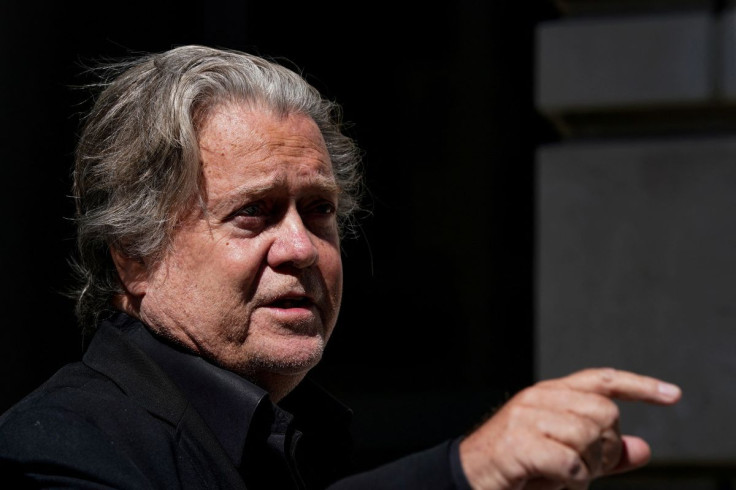Trump Ex-adviser Bannon Felt He Was 'Above The Law,' Prosecution Tells Jury

A federal prosecutor told jurors on Tuesday at Steve Bannon's criminal trial that the prominent former presidential adviser to Donald Trump decided he was "above the law" in defying a subpoena from the congressional committee investigating last year's attack on the U.S. Capitol.
The prosecution and defense delivered opening statements after jurors were selected in the trial, with the government's first witness then testifying. Evan Corcoran, a lawyer for Bannon, said in his opening statement that Bannon did not ignore the subpoena and in fact engaged with the committee in the belief that it would negotiate with his attorney and that its deadlines "were not fixed - they were flexible."
Bannon, 68, has pleaded not guilty to two misdemeanor counts of contempt of Congress brought after he declined last year to provide testimony or documents to the Democratic-led House of Representatives select committee.
The subpoena issued last September, prosecutor Amanda Vaughn told jurors, "wasn't optional. It wasn't a request. And it wasn't an invitation. It was mandatory."
"The defendant decided he was above the law," Vaughn added. "That's why we're here today."
Vaughn said the committee had reason to believe Bannon might have information about the events leading up to the Jan. 6, 2021, riot. Trump's supporters stormed the Capitol and attacked police in a failed effort to block formal congressional certification of his 2020 election loss to Democrat Joe Biden.
Bannon "didn't get stuck on a broken down Metro car," Vaughn said of the defendant's refusal to comply with the subpoena, referring to the Washington area's subway system. Instead, the case is about "the defendant thumbing his nose" at the normal process of government, Vaughn added.
Corcoran said that committee staff and lawyers for proposed witnesses almost always negotiate - and witnesses often appear at a date later than the one specified in a subpoena.
"That's the process," Corcoran said.
'A VIOLENT ASSAULT'
Kristin Amerling, the committee's general counsel, was the first prosecution witness.
"When the committee issues subpoenas with deadlines, is it important to the committee for people to comply with the deadlines?" Vaughn asked Amerling.
"Absolutely," Amerling replied. "The select committee is looking at a violent assault on the United States Capitol, on law enforcement, on our democratic institutions. We have a limited amount of time."
Amerling said the committee's authority expires at the end of 2022.
In explaining the panel's interest in hearing from Bannon, Amerling noted that he had told a podcast the day before the riot that "all hell is going to break loose tomorrow" and that the committee wanted to learn whether he had advance knowledge of the attack.
Twelve jurors and two alternates - nine men and five women - were selected, with U.S. District Judge Carl Nichols presiding over the trial.
Nichols previously ruled that Bannon could not claim he failed to comply with the subpoena because he believed his documents and testimony were protected by a legal doctrine called executive privilege that can keep certain presidential communications confidential.
The judge also has barred Bannon from telling jurors that he relied upon advice from his lawyer, who told him there were valid legal reasons he could fail to respond to the subpoena.
Corcoran told jurors that Bannon after being subpoenaed sought advice from an attorney, Robert Costello, who then raised objections with the committee including whether the requested information was protected by executive privilege. Corcoran said that these objections are "not an excuse" for failing to comply, but the fact that Bannon's lawyer directly engaged the committee showed that the defendant did not willfully ignore the subpoena.
Bannon reversed course this month and said he wanted to testify before a public committee hearing, nearly 10 months after defying the subpoena. There has been no indication of any plan to have him do so, as the committee likely would want him to first testify in closed sessions in order to cover a wide range of matters. Trump told Bannon he was waiving any executive privilege claim.
"You will also see the excuse the defendant gave for not complying. You will see he claimed something called a privilege," Vaughn told the jury.
As a top adviser to the Republican Trump's 2016 presidential campaign who later served as White House chief strategist, Bannon helped articulate the "America First" right-wing populism and fierce opposition to immigration that helped define Trump's presidency.
© Copyright Thomson Reuters 2024. All rights reserved.





















